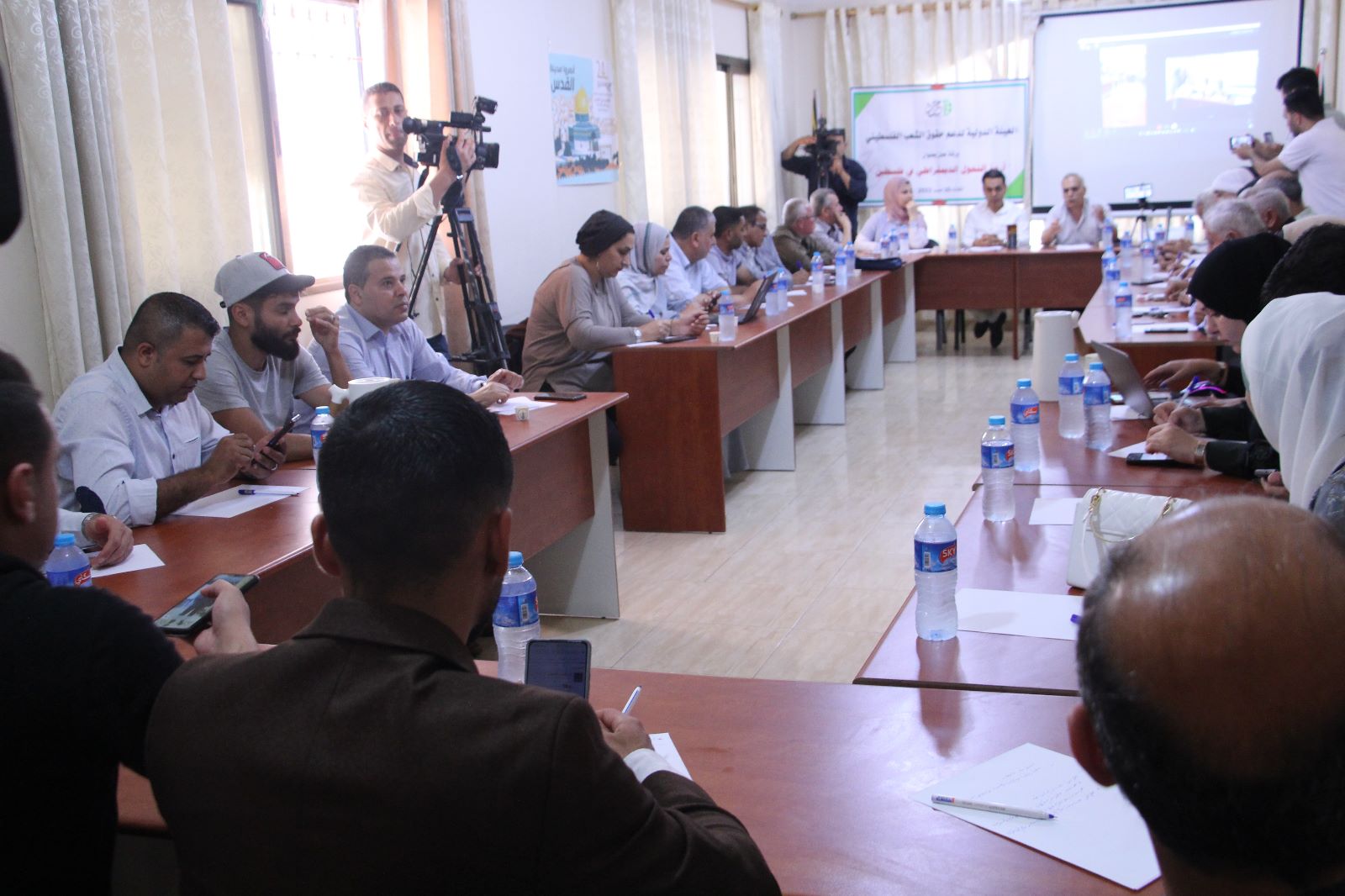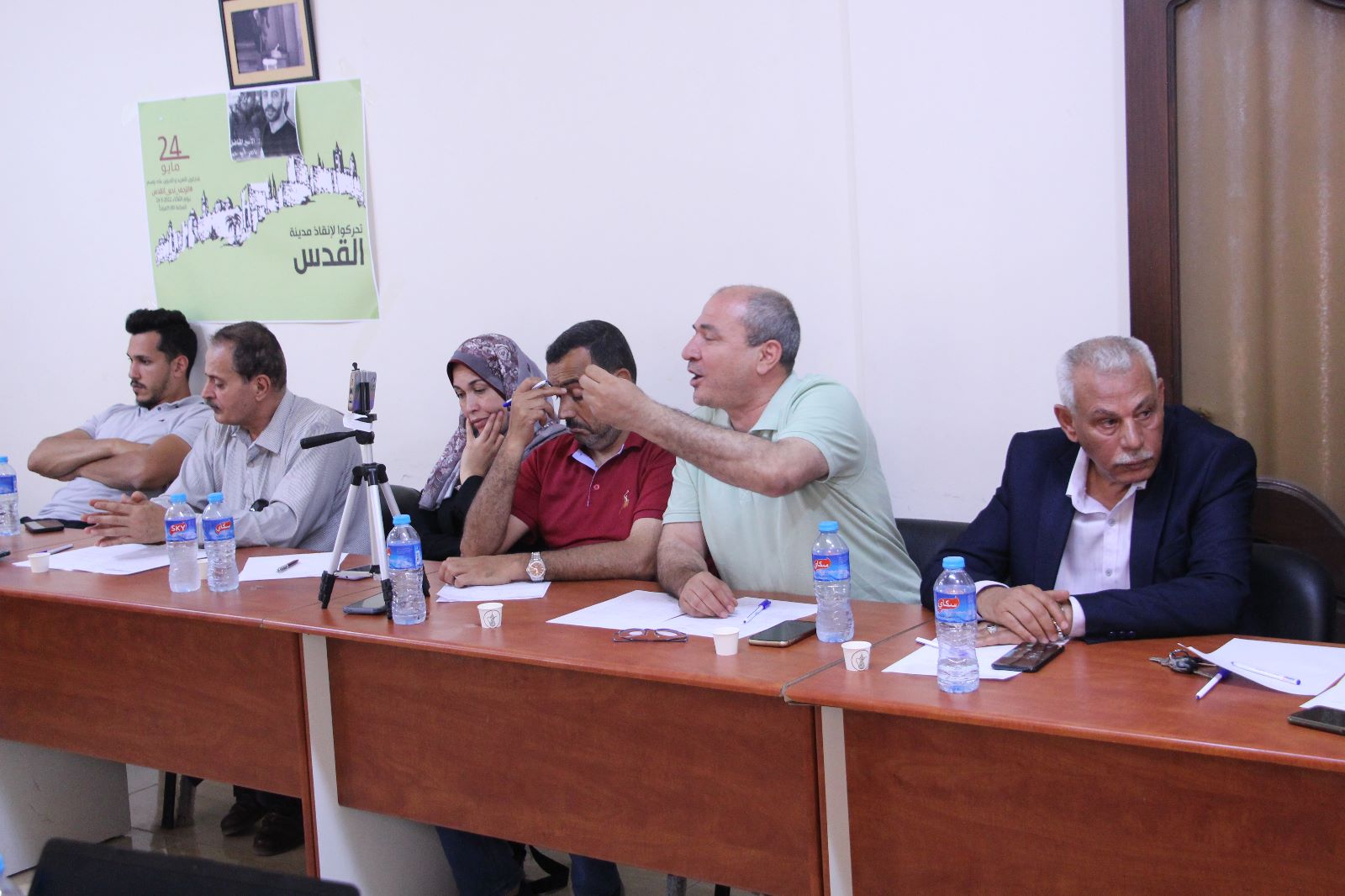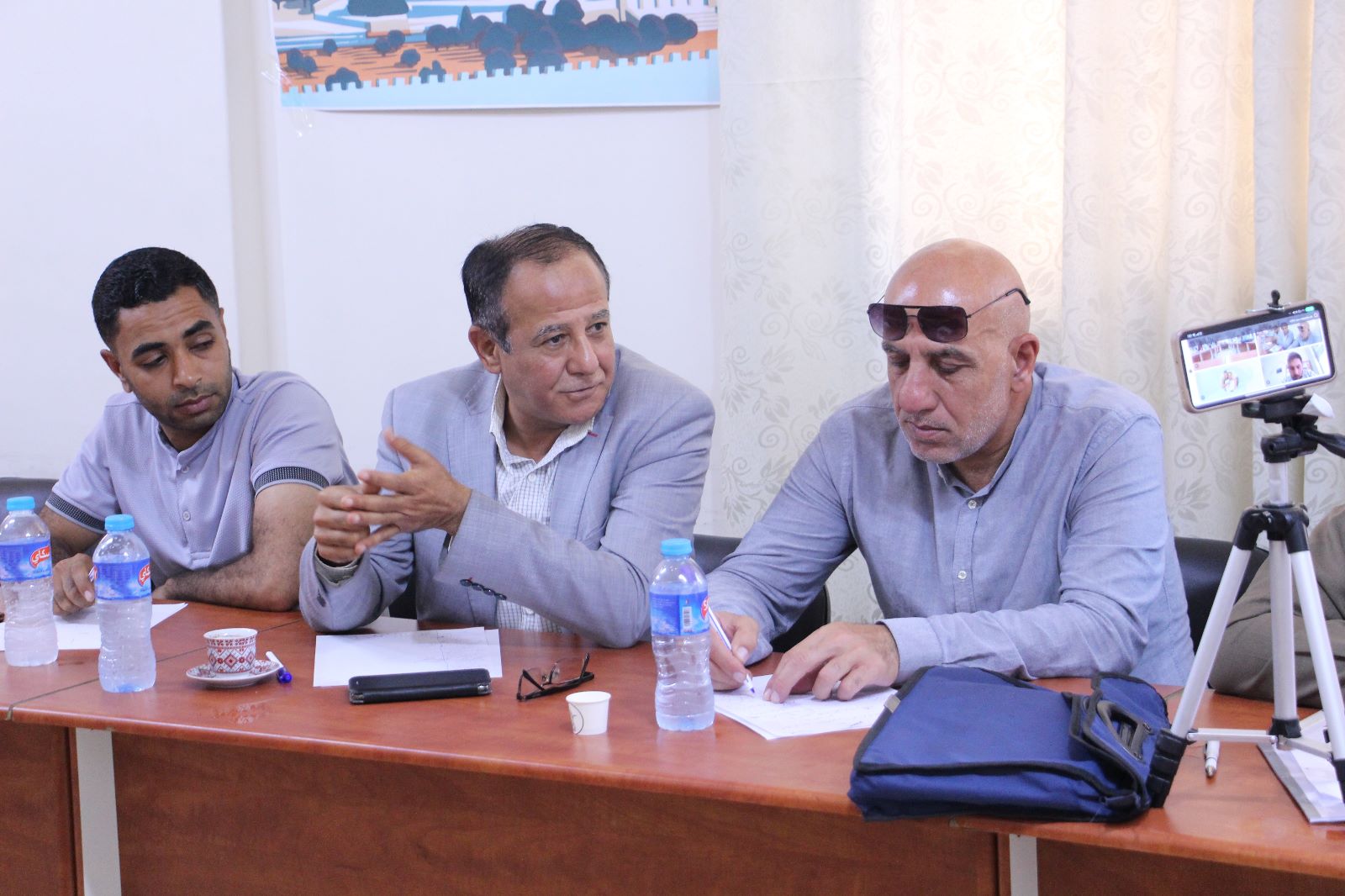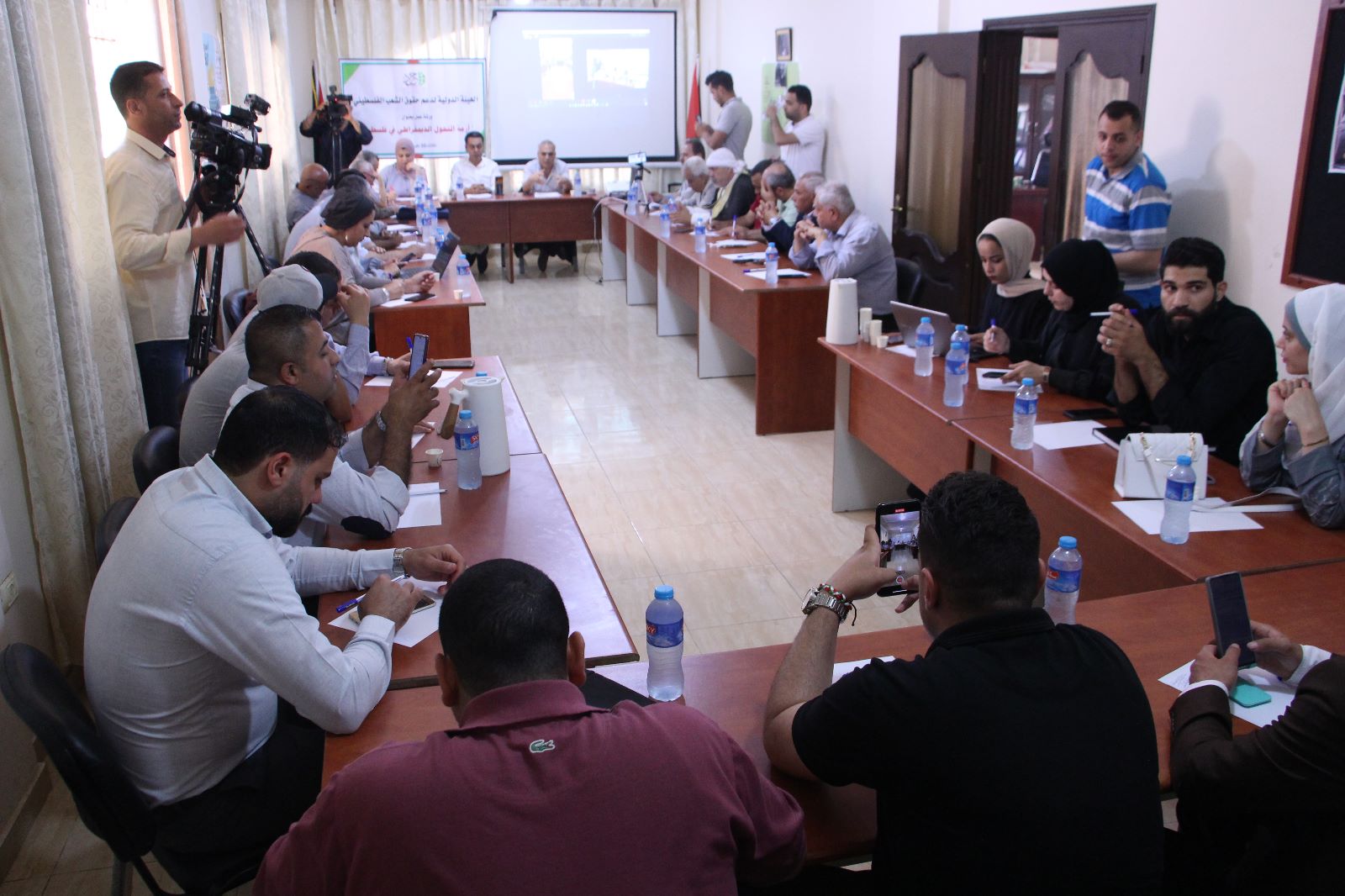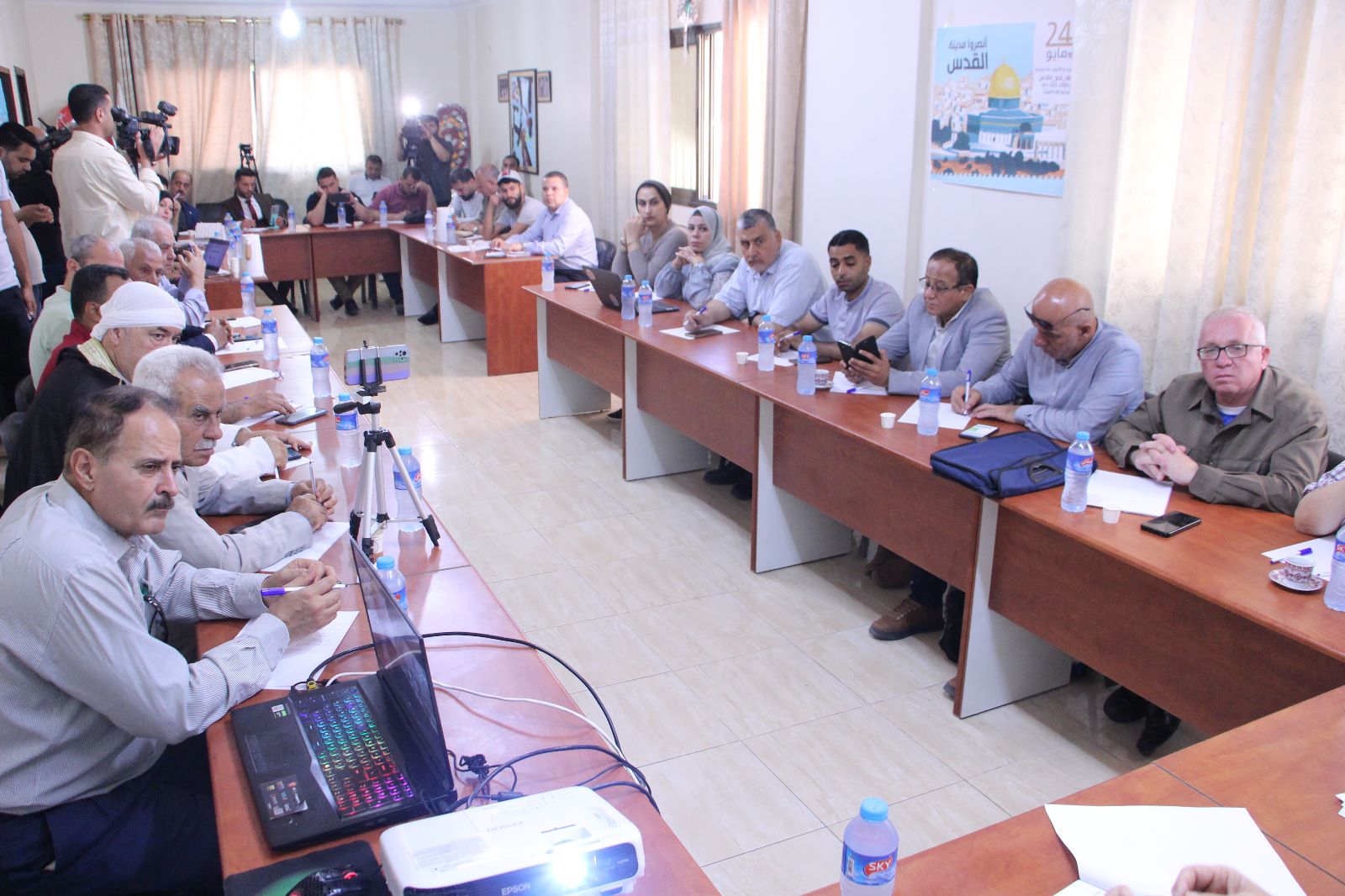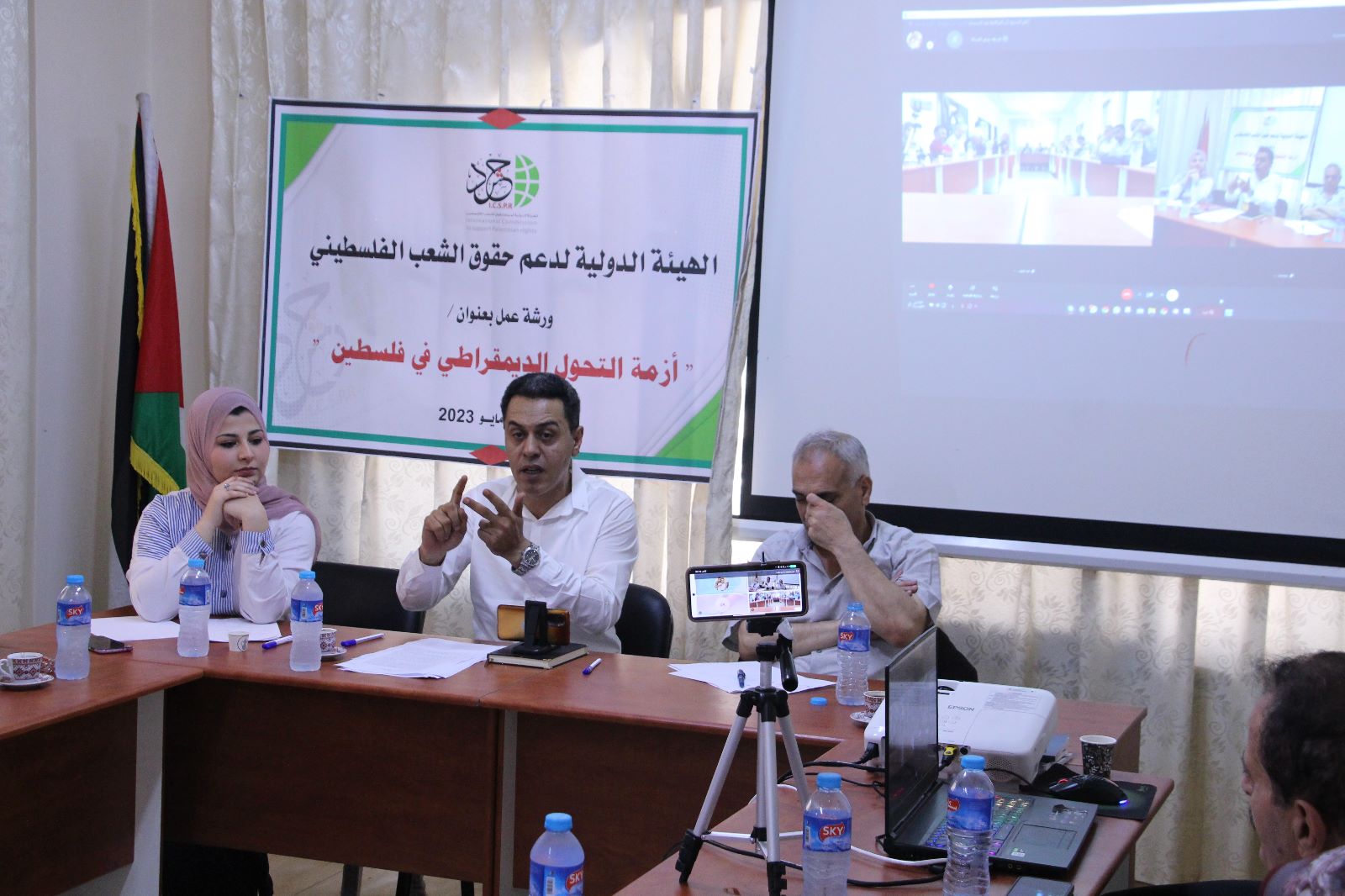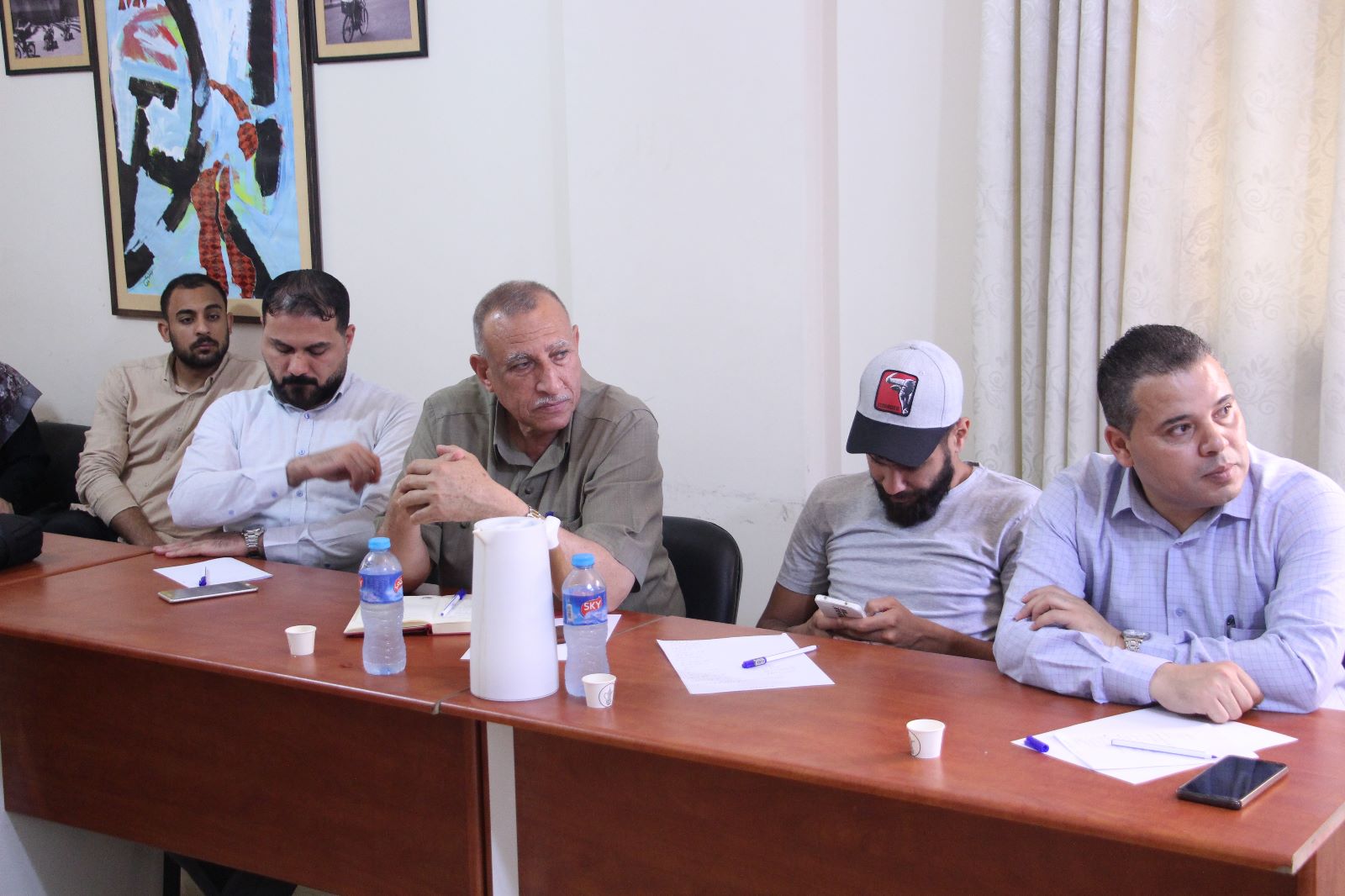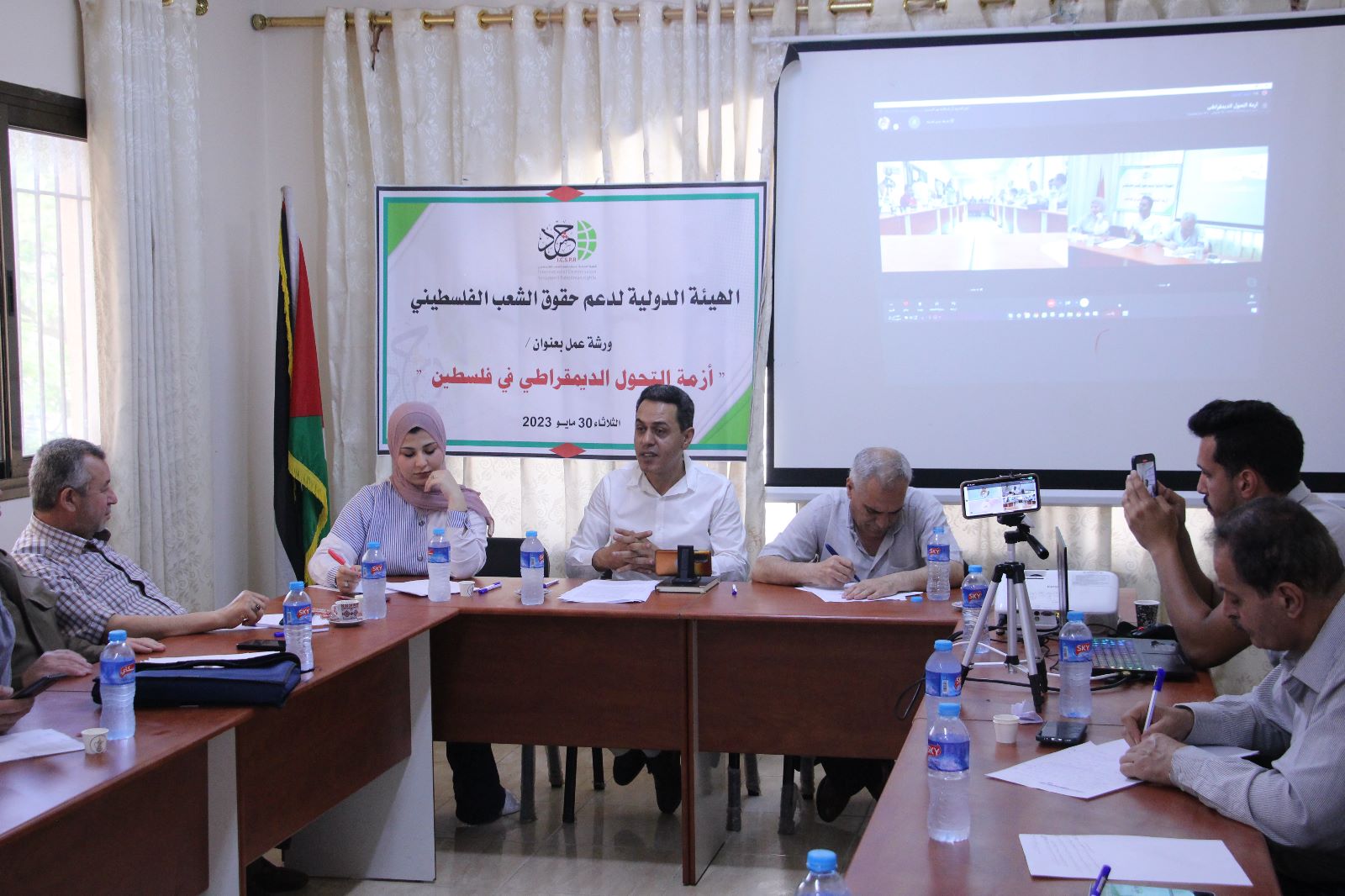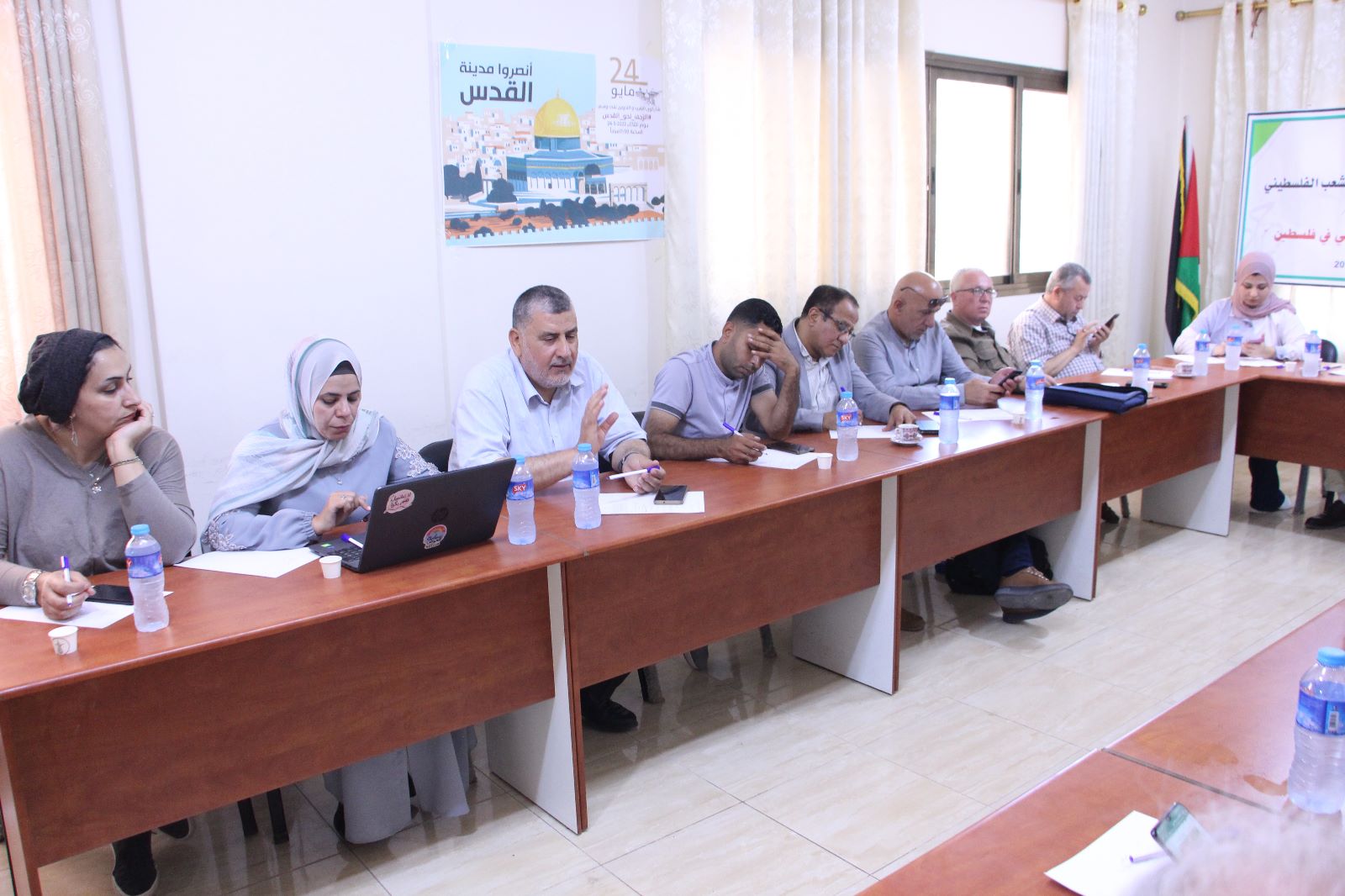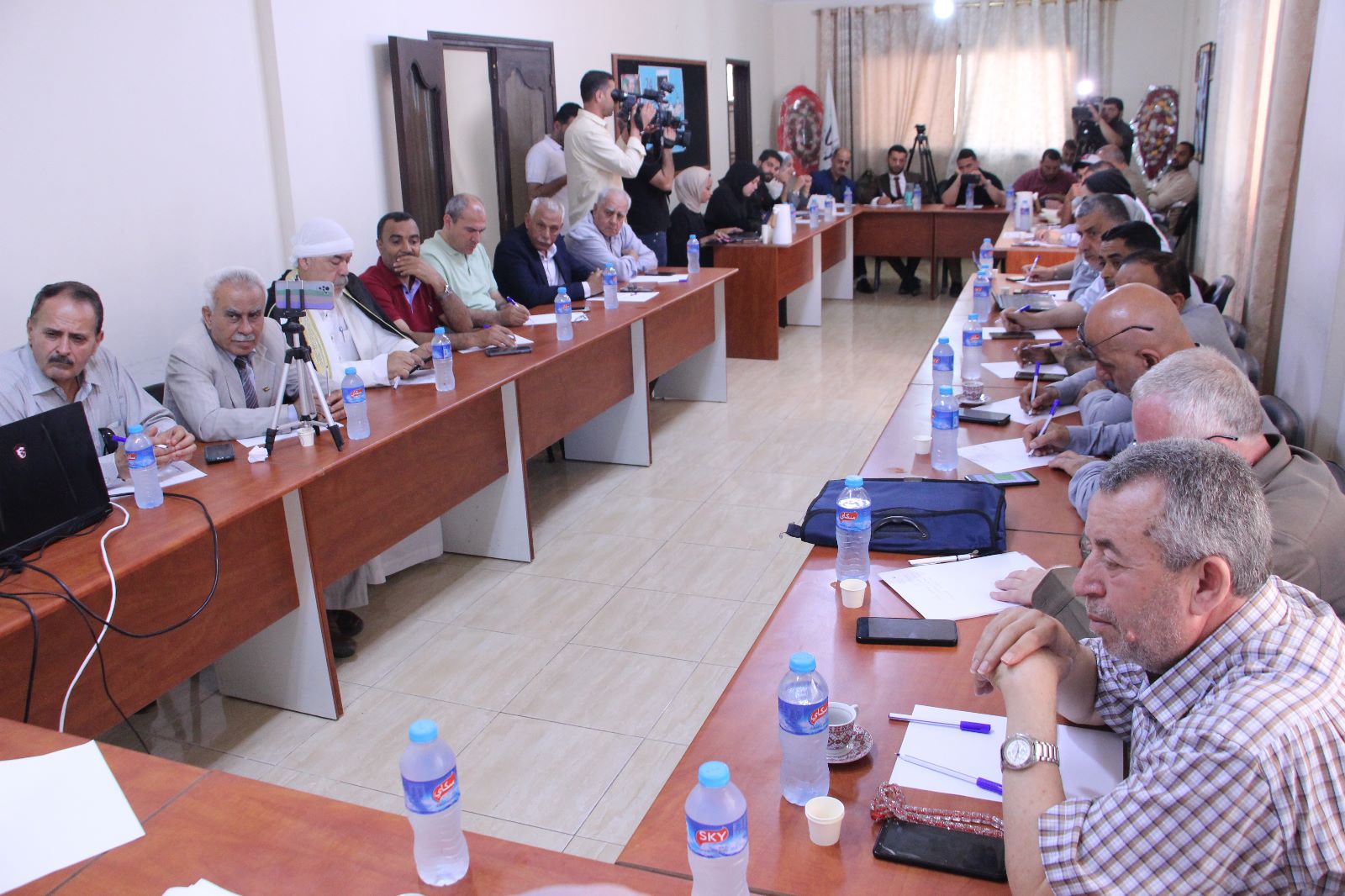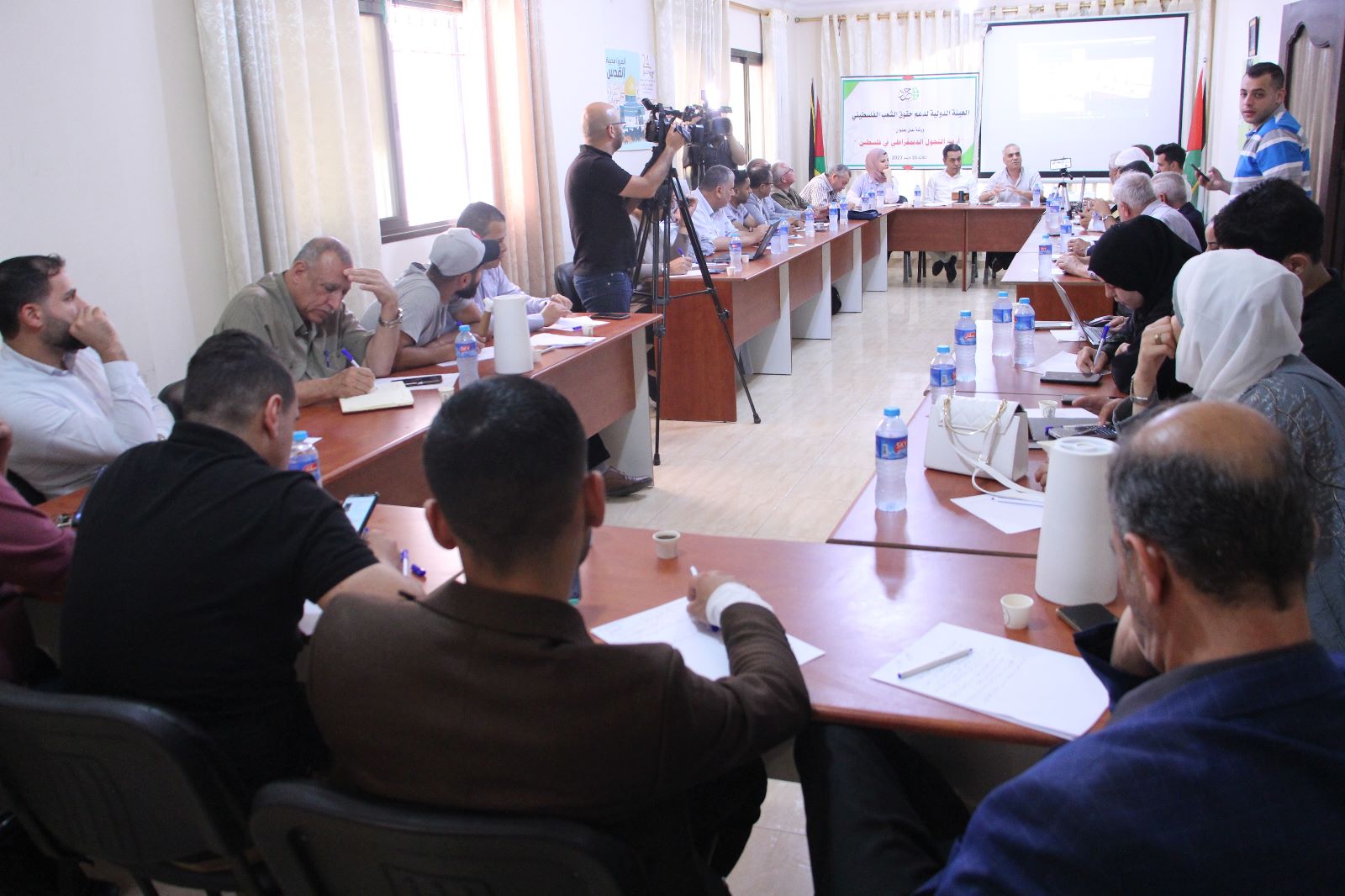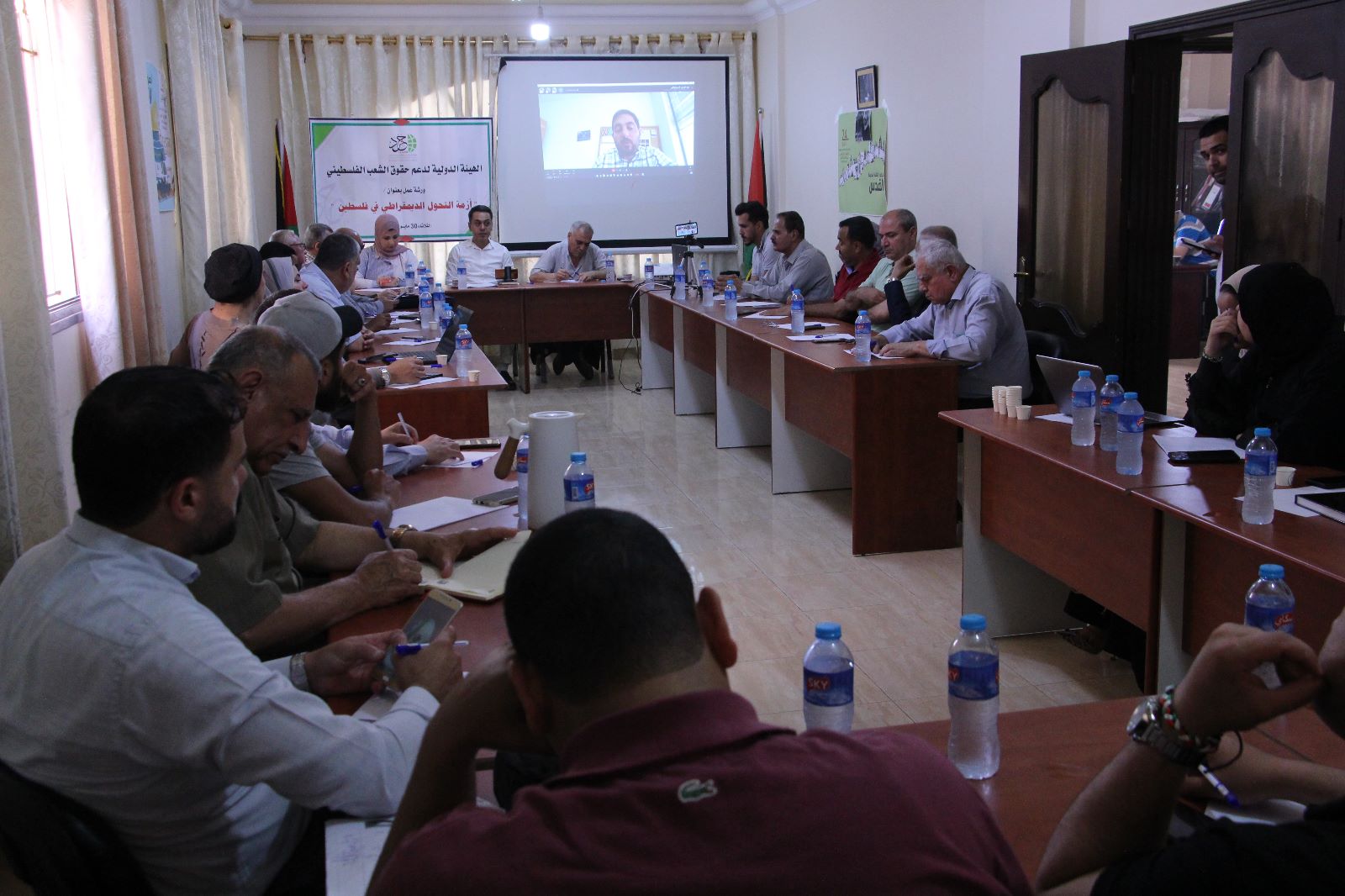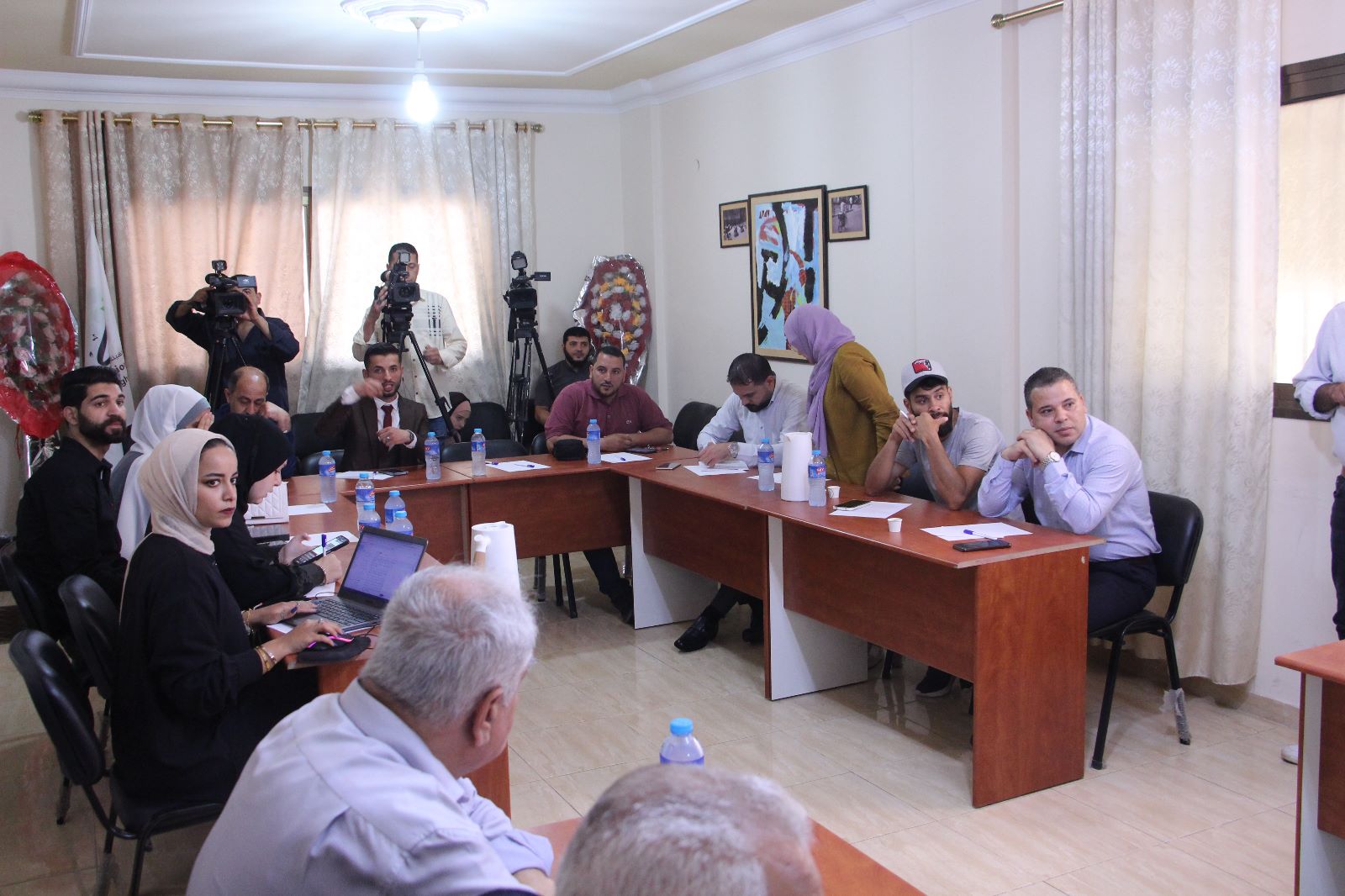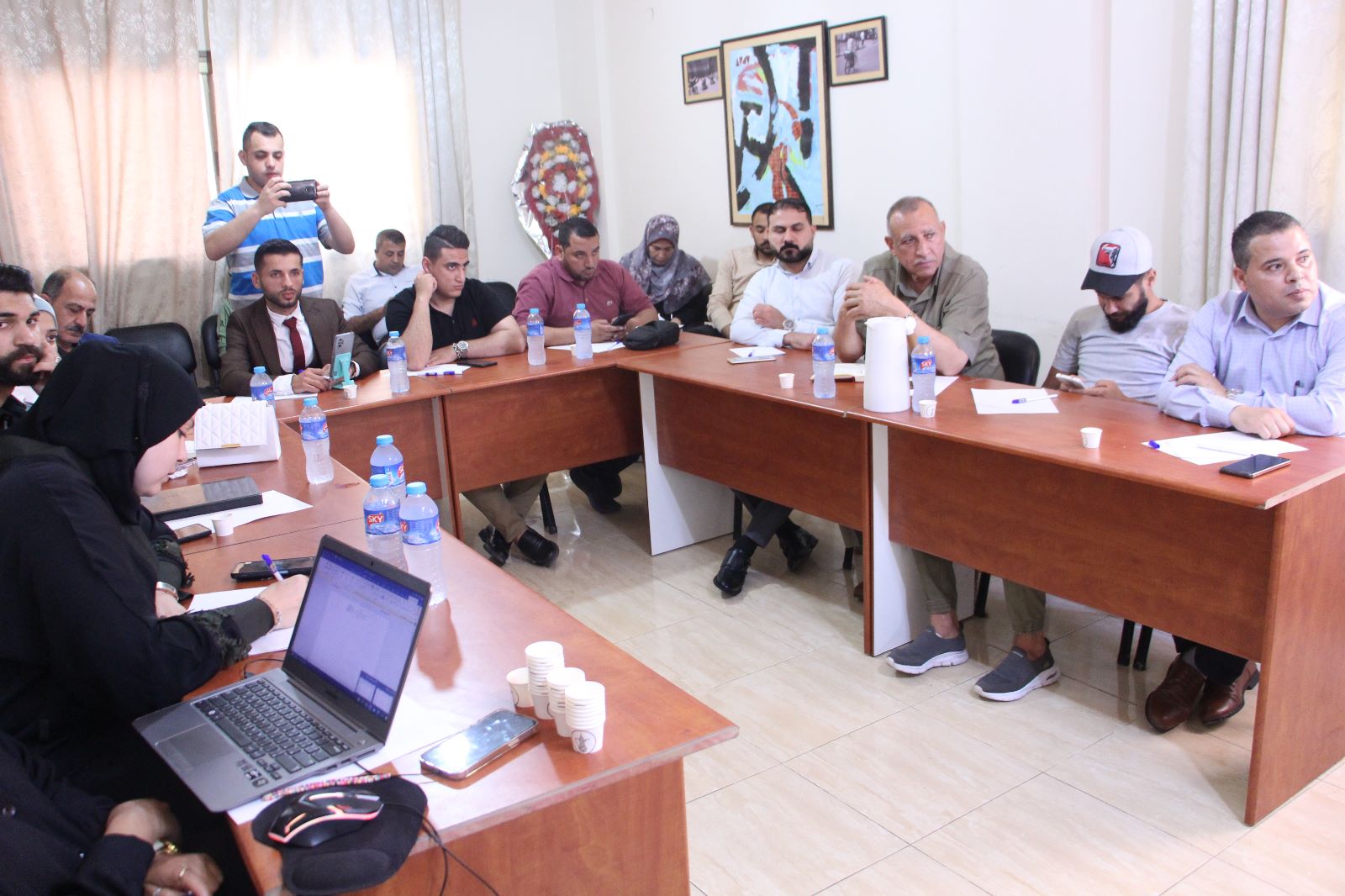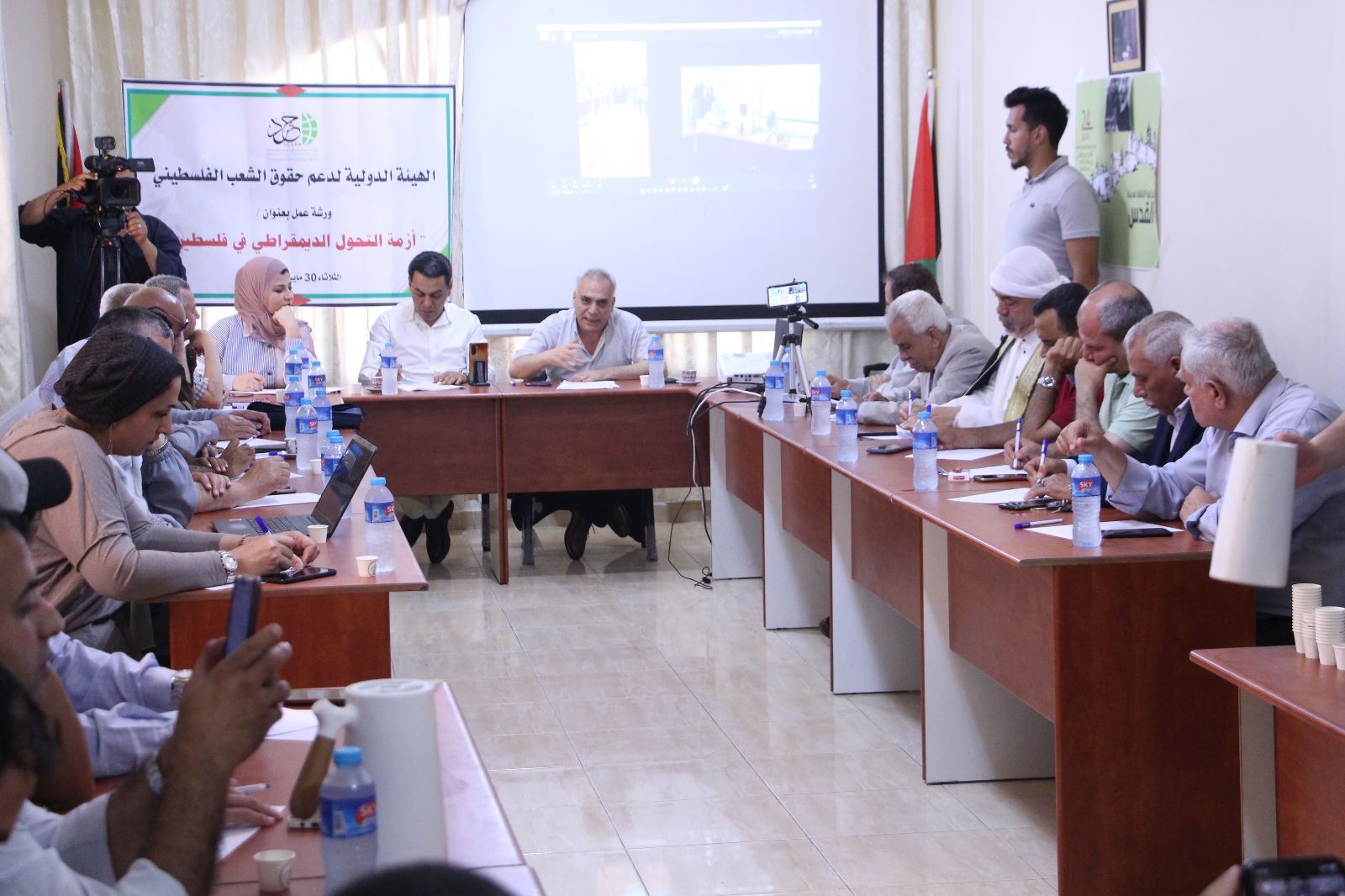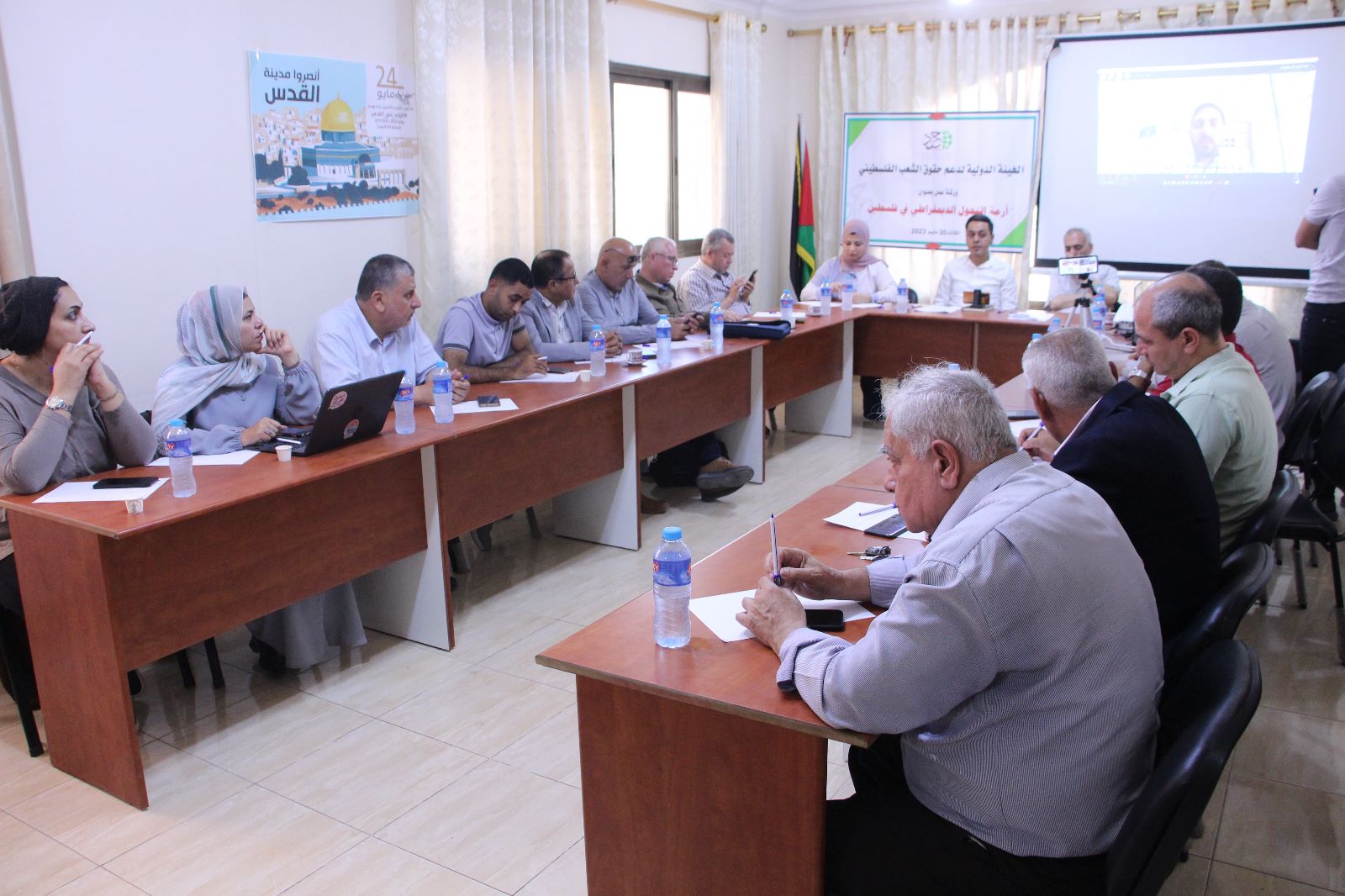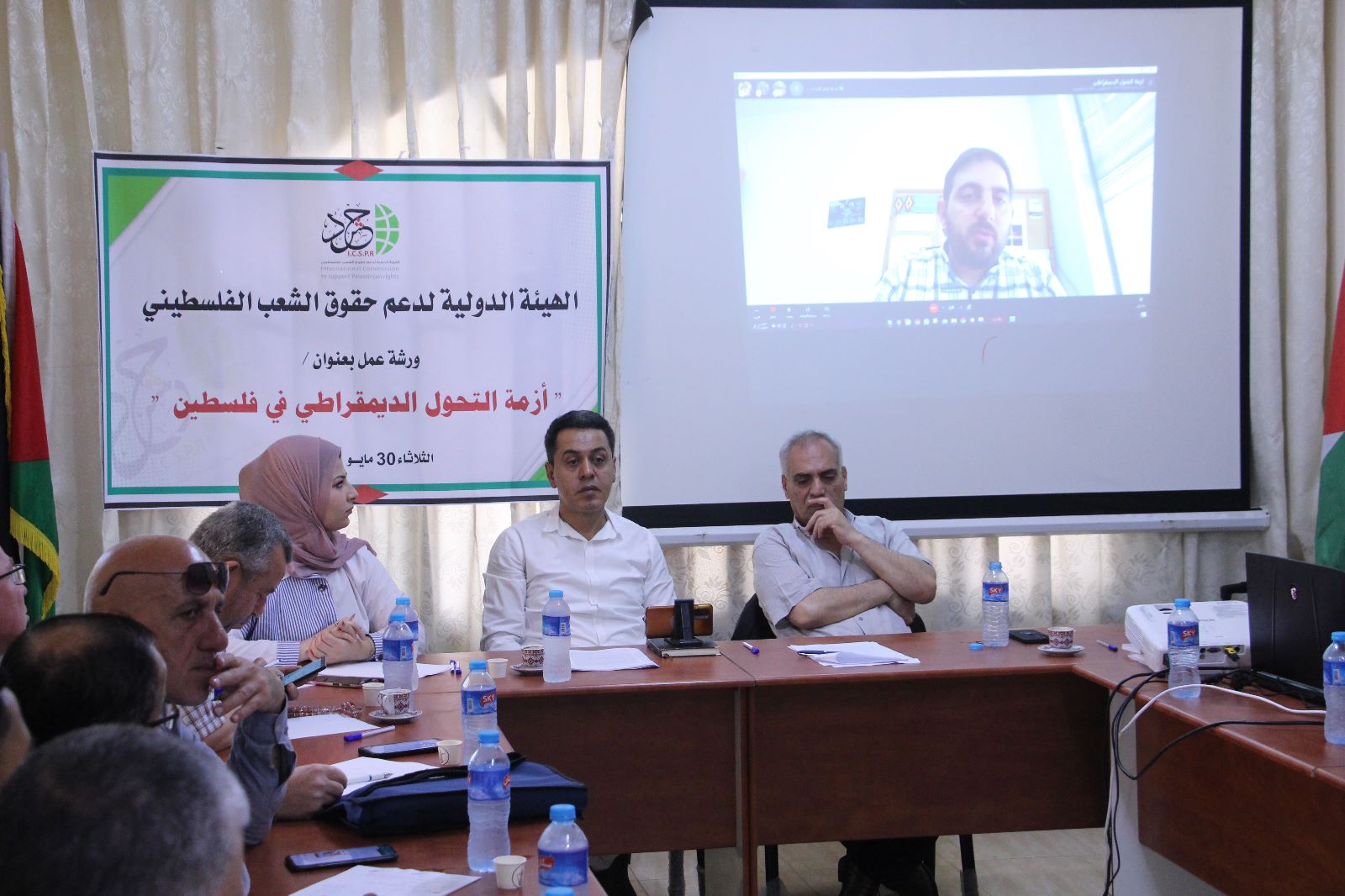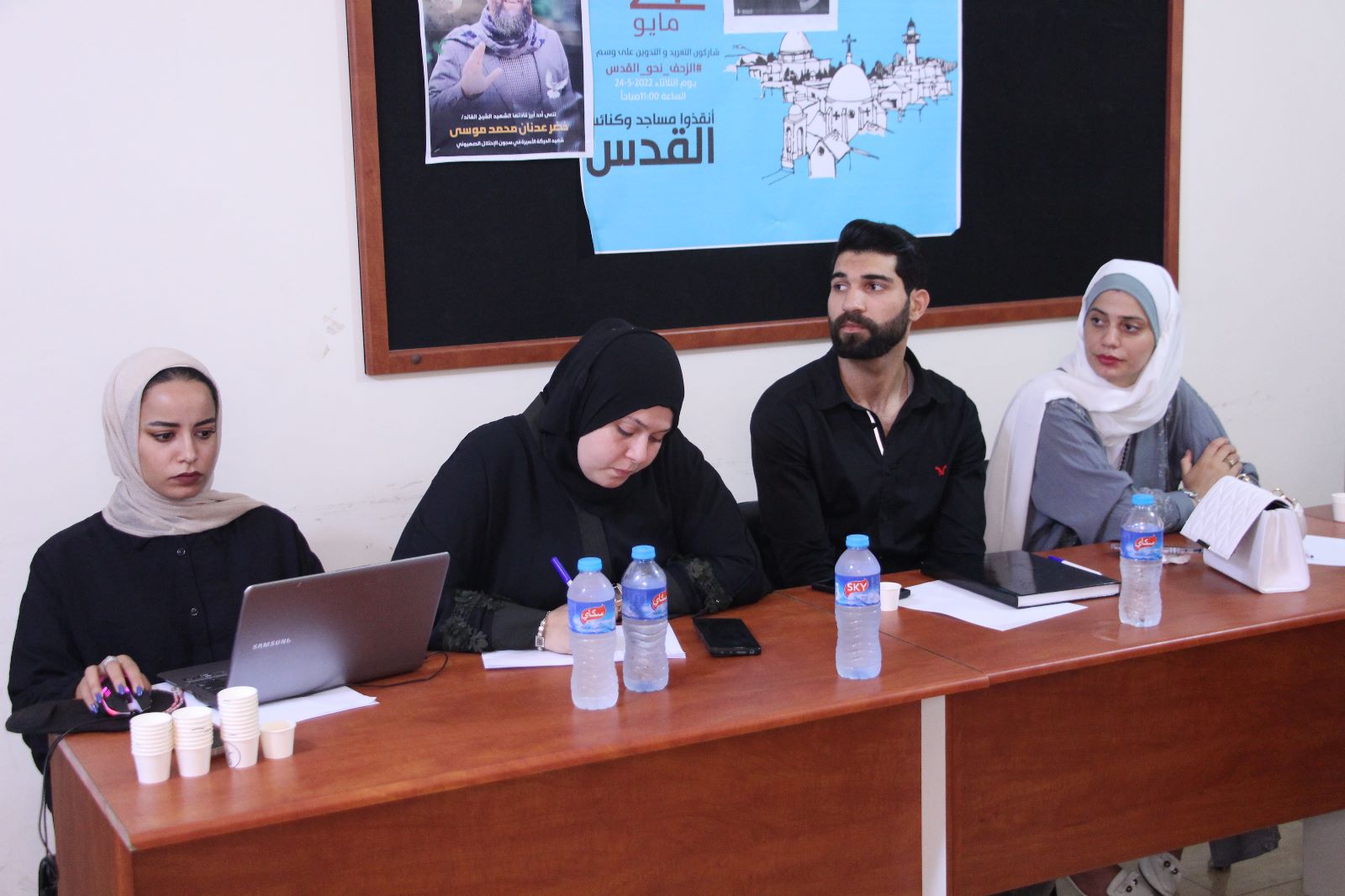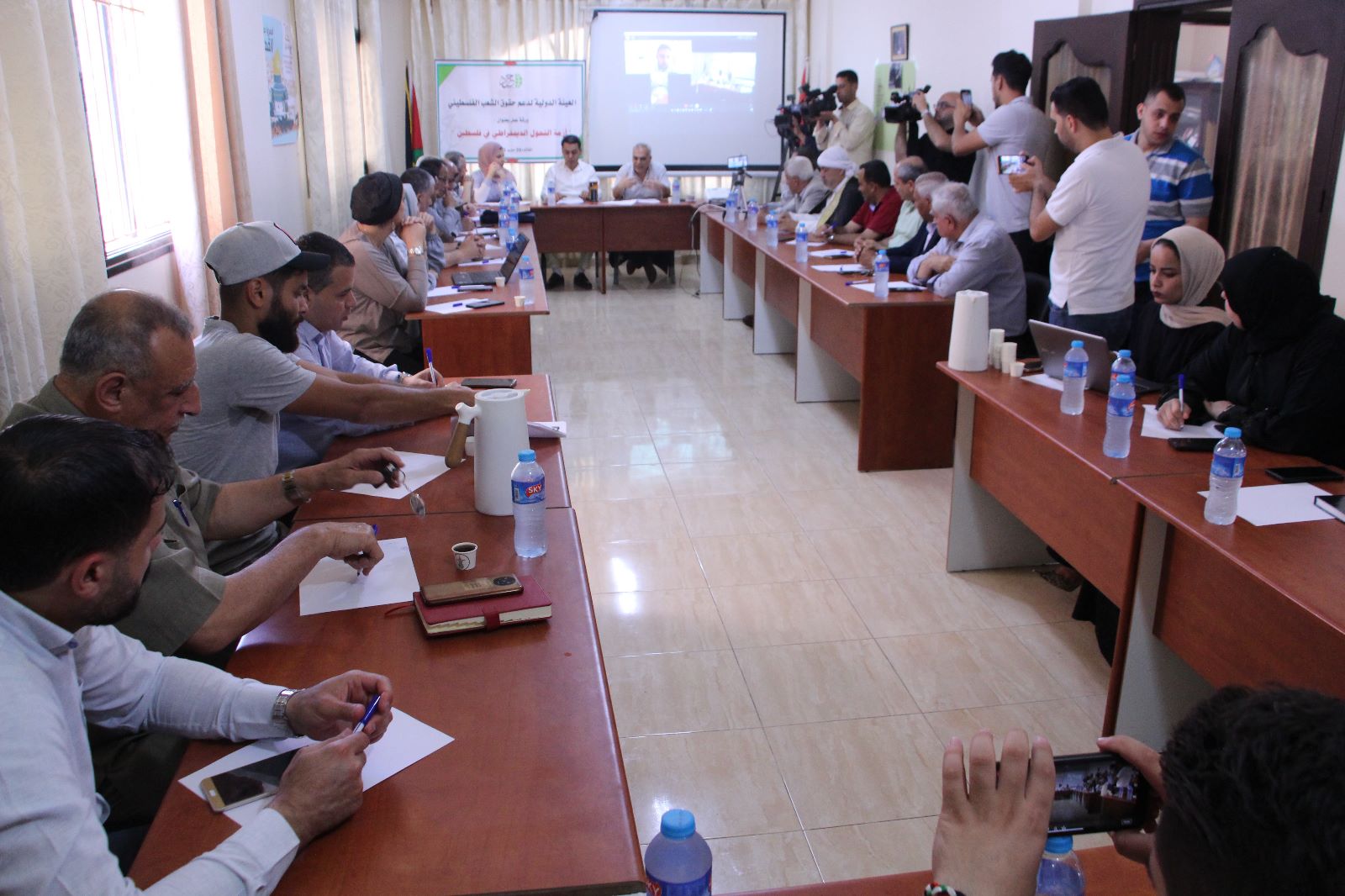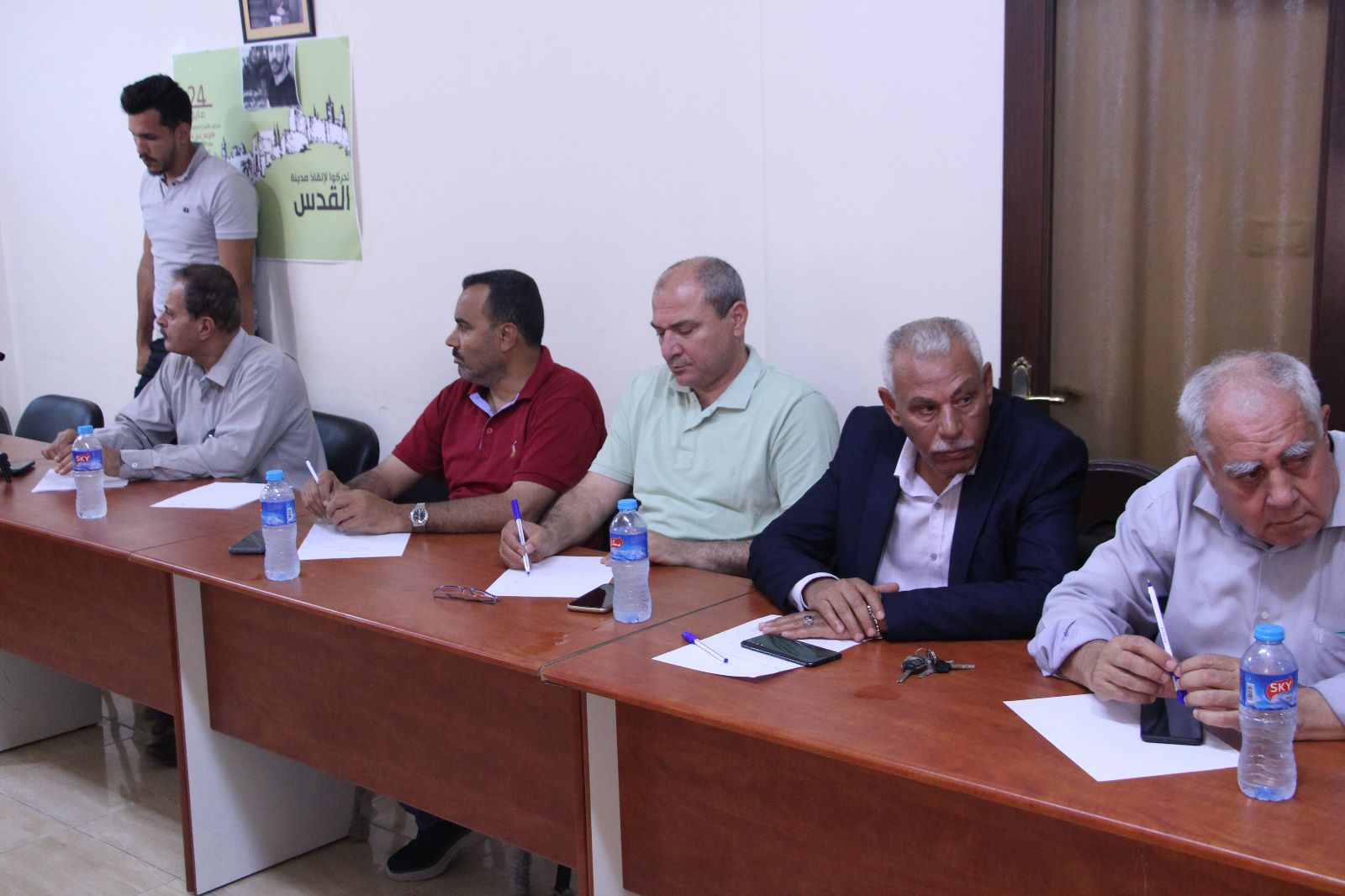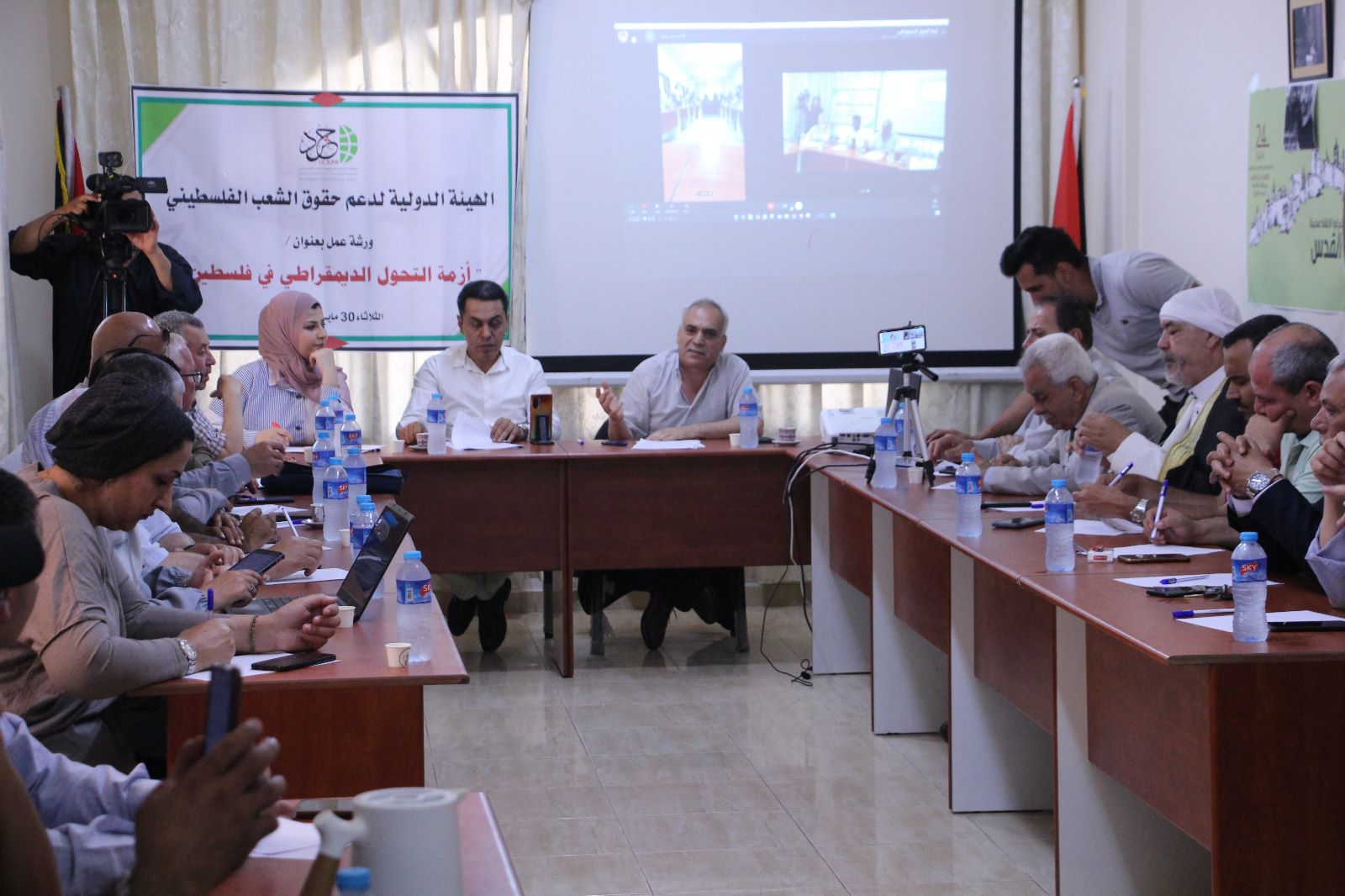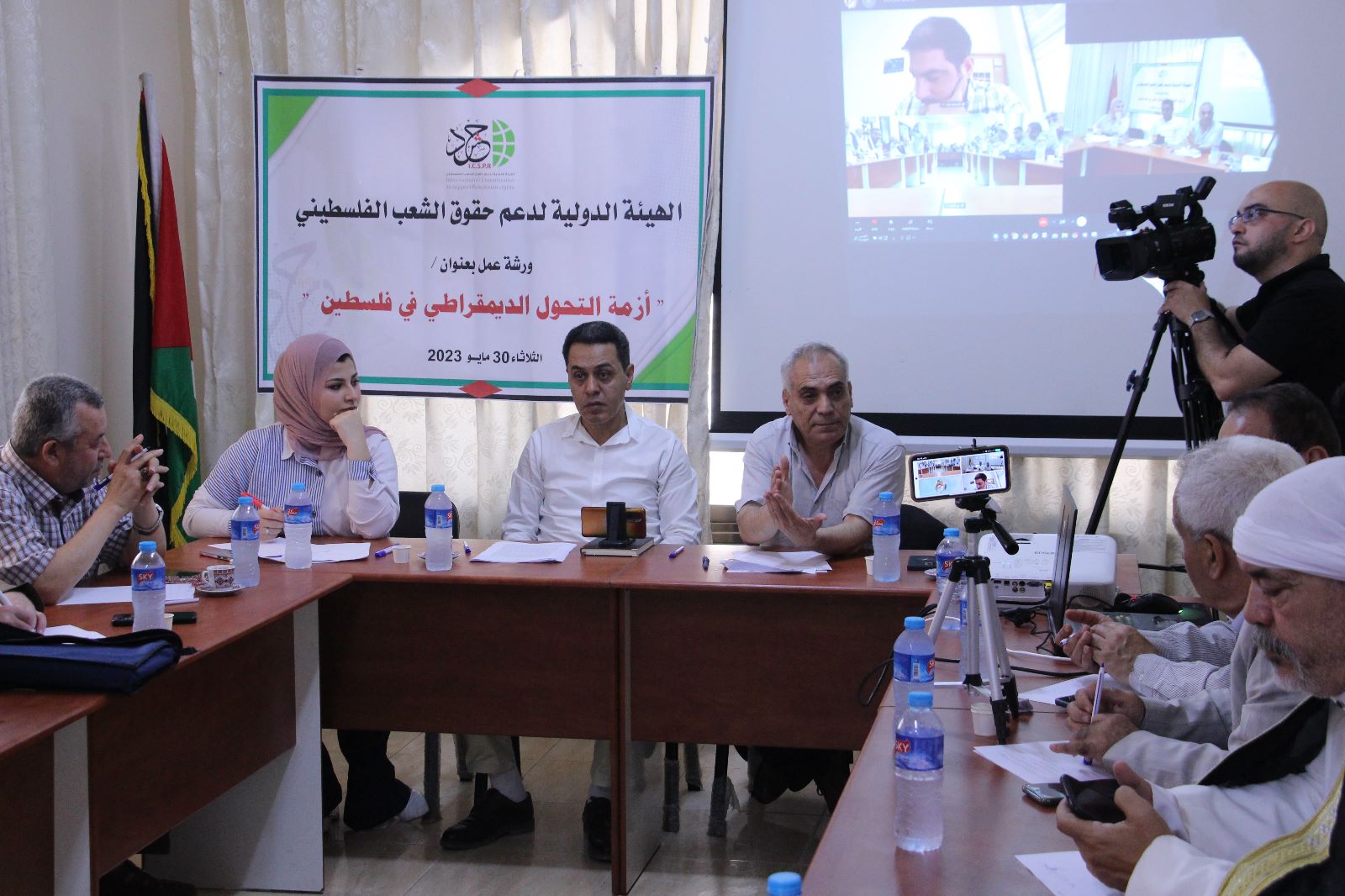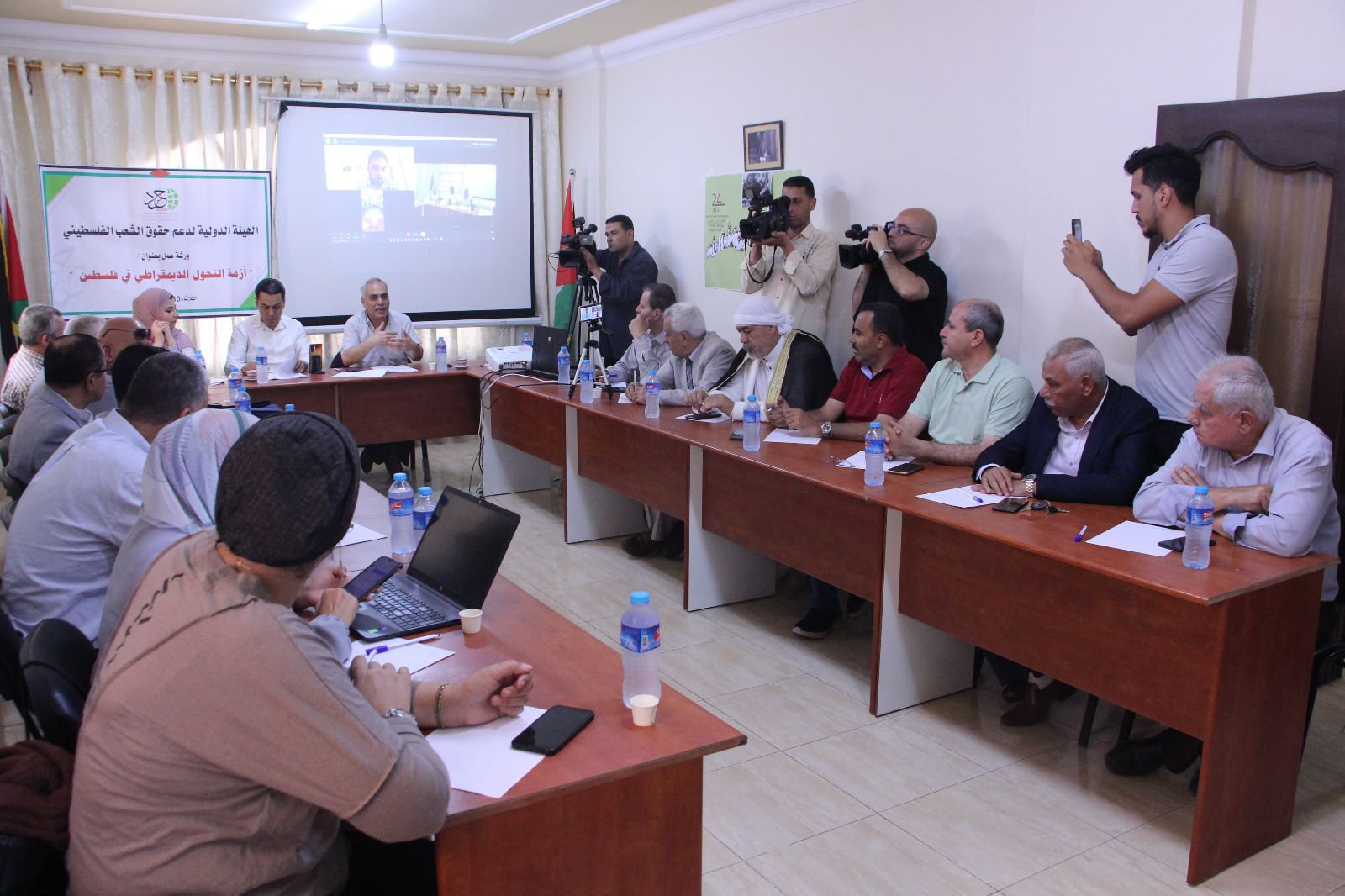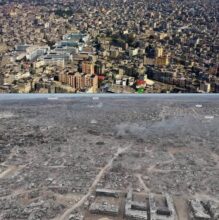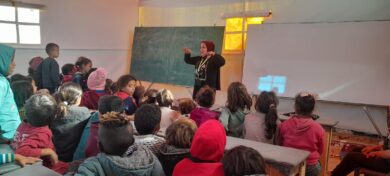
During a workshop organized by “Hashd”,,Specialists provide a view on how to overcome Palestine’s democratic transition dilemma and its necessities.
Reference number: 42/2023
Date: May 30, 2023
Native language: Arabic
press release
During a workshop organized by “Hashd”.
Specialists provide a view on how to overcome Palestine’s democratic transition dilemma and its necessities.
Specialists recommended that political decision-makers should have a strong desire for growth and change, since this is a critical aspect in moving the democratic process ahead, especially if the leadership’s efforts are joined with popular awareness.
They also emphasized the importance of involving citizens in decision-making, informing them of the reality of the situation, allowing for opposition and objective criticism aimed at dialogue, raising citizens’ awareness of the importance of elections, encouraging political parties and candidates to participate more in public political debates, and directing discussions to issues of interest. Citizens’ interests, encouraging women’s involvement in the voting process, and revising the election legislation are all priorities.
They stated that achieving national reconciliation, ending the catastrophic division, reformulating the national movement and the Palestinian system, adopting a national program, establishing a full national partnership in the organization, the authority, the National Council, the Legislative Council, and various institutions, consolidating democratic political pluralism, and generating a new, vibrant, and dynamic political elite committed to And willing to pay the national liberation stage’s dues with bravery, free of corruption, illicit gain, slackness, impotence, failure, and the exclusion and exclusivity attitude,
This happened during a meeting today, Tuesday, of the International Commission Rights “Hashd” headlined “The Crisis of Democratic Transition in Palestine.” The session was launched and welcomed by lawyer Rana Abu Hudaib.
Eng. Tayseer Muheisen, development specialist and Coordinator of the NGOs Network gives a perspective on the democratic transition in the occupied Palestinian territories from 1967 to the present. There are three stages: the first is a democratic tendency paralleling the propensity for freedom (1967-1993), the second is failing democracy (1993-2005), and the third is democratization leading to political breakdown (after 2005).
He pointed out that Palestinians experienced democratization as a result of their historical legacy before the Nakba with the precursors of modernity, education, journalism, urbanization, party formation, and also through their contact with many and varied experiences through asylum, education abroad, or observing the Israeli experience, and finally the PLO’s experience, “democracy in the jungle of guns.” The necessity for democracy is attributed to middle-class elites, charismatic party leaders, and the importance of civil society organizations.
Muheisen referred to the crisis of democracy in Palestine, a complex crisis experienced by a people suffering under the yoke of racist, settler, and current occupation, a people that has been fluctuating for 100 years between tradition and modernity and the abortion of its development and modernization experiences, and thus it is a crisis of political culture and a crisis of political organizations, emotionally disconnected from social and political representation a people that has been fluctuating for 100 years between tradition and modernity and the abortion of its It is based on a great vision, a dazzling slogan, external backing, and the adoption of populist measures, and it does not exercise democracy in its internal existence; it is experiencing splits and a crisis of dependent authority; it has failed in its uniting and statist role. it is based on nepotism and the consecration of the clientelist relationship.
“It is also a civil society crisis that falls within the authority’s system or the foreign aid system, which has lost its opposition and resistance character,” he stated. It is a foreign aid crisis that is being used to influence, political blackmail, and control Palestinian political decisions and choices,” emphasizing the existence of a national project crisis that lacks a societal and democratic dimension and has yet to achieve its goals and maintain its momentum and effectiveness.
Muhaisen stated that our country now lacks any expression of actual democratization. The continuation of two separate and opposing regimes of control that practice tyranny and are permeated by multiple manifestations of corruption, unaccountable, working within a formal pluralism that grants them exclusivity, domination, and possession of power and wealth, with the presence of a flabby party system, whose components do not believe in democracy or practice it internally, with the system’s weakness Politics’ successful performance and failure, the failed management of society and people’s affairs, the decline of democratic political culture, the disruption of elections, the rejection of attempts to reform the PLO and its use in the context of factional conflict, and the prevalence of the logic of division in all aspects of our lives.
According to Mr. Abi Al-Aboudi, Director of the Bisan Center for Research and Development, “the Palestinian political, economic, and social scene, particularly in the West Bank and Gaza Strip, shows an unprecedented deterioration in all relevant indicators.”
And he stated that the aim at the outset of change is to develop a popular democratic current that is connected with our Palestinian people’s historical rights and to hold elections following the living forces of our people and its independents. Independents, groups, and social forces that have demonstrated their commitment to protecting the interests of Palestinian society in recent years, and working according to programs that enhance the steadfastness of the Palestinian people on their land in the West Bank and Gaza Strip.
Al-Aboudi also emphasized the importance of mobilizing the Palestinian diaspora and the Palestinian interior as a basic body of the democratic popular movement, as well as working to mobilize the democratic construction of this movement wherever possible and forming a pressure force to reform and rebuild Palestine Liberation Organization and give impetus to Palestinian popular democracy.
He highlighted that as long as there is nearly a factional consensus on joining the electoral arena, it is preferable to focus on political separation, which is one of the organization’s objectives, from my everyday life, which is one of the tasks of a limited authority in the West Bank and Gaza Strip. Socioeconomic.
Al-Aboudi emphasized the importance of candidates stating their positions on the presidential and National Council elections in advance, as well as extending alliances to the next two stages of the elections, emphasizing the importance of involving the unorganized public in the factions in the candidacy process through alliances with its actors and influential figures in society.
And he emphasized the importance of clear social economic programs among the forces concerned with change, addressing those who have suffered social injustice and expressing their concerns, noting that the Legislative Council elections are not the end, nor are they a strategic action, but rather a temporary process subject to the public mood, so the Fighting the battle here should not bear what is unbearable, unless the next two stages of the elections are As a result, the effort to restructure the Palestinian political system and establish its references must continue without regard for the complicated conditions that, in light of technological growth, offer a thousand solutions.
Dr. Salah Abd El Atei, Chairman of the International Commission “Hashd,” for his part, spoke about the ramifications of the democratic transition crisis, the consolidation of absolute rule, and the undermining of the institutions of the Palestinian political system, as well as the exorbitant cost of these ramifications and dangerous transformations, beginning with the second legislative elections in 2006 and ending with the dangers of the current stage of the political system’s transformation. the political division and its repercussions on the institutions of the political system, and changes in the political and constitutional system The Palestinian people, and the requirements for ending the era of hegemony, exclusivity, and absolute power:
He stated that we are confronted with this reality and that rolling in absolute power, dominance, and exclusivity in all institutions of the political system will lead to a dictatorial authority that establishes a real separation between the Gaza Strip and the West Bank and establishes absolute rule in the political system, which means perpetuating political corruption, individualism, and police power, as well as the absence of democracy, including what it entails. Human rights violations, the absence of the rule of law, the separation of powers, and the independence of the court.
Abd El Atei highlighted that we are facing one of three scenarios: a reconciliation process that rebuilds the institutions of the Palestinian political system, an agreement to hold comprehensive elections, the continuation of the current situation, and the collapse of the authority.
In addition, he stated that the requirements for ending the era of dominance, exclusivity, and absolute power are represented in the continuation, strengthening, and unification of societal and national efforts in the West Bank and Gaza Strip, leading to comprehensive reform in the political system, judiciary, and justice sector. Based on restoring national unity and rebuilding the institutions of the political system based on political partnership, respect for the rule of law, separation of powers, international conventions and standards for human rights, and drawing lessons and lessons from the failures of previous reforms in a way that ensures the re-approval of a new national charter “the social contract is constitutional” and the PLO and reform, and agreement on arranging the internal house under the developments that accompanied the international recognition of a new status for the occupied State of Palestine.
Abd El Atei demonstrated the importance of reforming the justice sector, moving away from the exclusivity of executive authority, quotas, and conflicts of interest, and repeating experiences that have failed in the past years, calling on the president and the Palestinian government to withdraw the current amendments, stop interfering with the work of the judiciary, and work to restore unity, rebuild, and unify the institutions of the political system.
He highlighted that national democratic rhetoric alone will not be enough to solve the problem and shift from impotence and paralysis to action. There is a need to implement social, economic, and security measures that are consistent with the language of a national liberation movement, emphasizing that getting out of the crisis necessitates national reconciliation, ending the tragic divide, and reformulating the movement. Patriotism and the Palestinian system, as exemplified by the adoption of a national program; Creating comprehensive national collaboration in the organization, authority, National Council, Legislative Council, and numerous institutions; Consecration of democratic political pluralism via periodic elections of the National Council and other national, labor union, and community organizations to renew blood and minds; The generation of a new, vibrant and dynamic political elite committed to the constants and ready to pay the benefits of the national liberation stage with courage, away from corruption, illicit gain, slackness, incompetence, failure, and the mentality of exclusion and exclusivity. We need a new structure in which women and youth participate; An intention that adopts the principle of comprehensive resistance to the occupation and to the entire racist Zionist colonial project.


